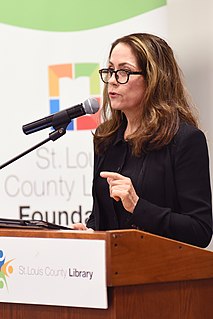A Quote by Jon Katz
We are human, and we suffer, and unlike the animals on the farm, we are self-aware, and we know that we suffer, and it doesn't hurt more or less if God caused it or could stop it, at least for me. I am definitely of the school that believes God has bigger stuff to worry about than me.
Related Quotes
God has made us humans in God's own image. So therefore the highest way to talk about God is by some kind of analogy with ourselves. So, naturally, if we who are finite and sinful suffer in multiple ways because of sin and evil and the horrible things that happen in our world, how much more does God, who is infinite, sinless, and knows the totality of all that happens to everybody, suffer pain and heartache at the suffering of his human and non-human creation - and be angry at all that causes it?
God cannot suffer - at least not as we do. It has some roots in Greek philosophy: if God is a perfect being, suffering would reduce that perfection, so God cannot suffer. More thoughtful theologians take the phrase in the sense of one of the confessions of faith that talks of God as being "without parts or passions" - he is not physical as we are, and not subject to "passions" in the sense of uncontrollable emotions that can take charge of us at times. God is not "emotional," if that word is used as some kind of weakness.
Keep me rather in this cage, and feed me sparingly, if you dare. Anything that brings me closer to illness and the edge of death makes me more faithful. It is only when you make me suffer that I feel safe and secure. You should never have agreed to be a god for me if you were afraid to assume the duties of a god, and we know that they are not as tender as all that. You have already seen me cry. Now you must learn to relish my tears.
Look, I don't know whether God exists. I don't know that. And I tell you one thing, I am not frightened of my beliefs. If there is a God who is threatening me with damnation because I don't believe in Him, so be it. I've lived my life in conscience, and I will suffer damnation willingly in conscience against a tyrannical God who would damn me because, on the basis of the intelligence He gave me, I have come to a conclusion doubting His existence, and I will continue to be a skeptic all of my life.
Most important, do not ever think that you and God are separate. Think always, "God is with me; He is inside me; He is around me. All there is is God. I myself am God. I am the Infinite, the Eternal. I am not two; I am one, only one. There is no one else besides me. I and God are one and the same." To realize this Unity, the first step is to develop Self-confidence. It comes when you realize that God is not outside of you.
The position of the Atheist is a clear and reasonable one. I know nothing about ‘God’ and therefore I do not believe in Him or in it; what you tell me about your God is self?contradictory, and therefore incredible. I do not deny ‘God,’ which is an unknown tongue to me; I do deny your God, who is an impossibility. I am without God.
The best test to know whether an entity is real or fictional is the test of suffering. A nation cannot suffer, feel pain or fear, or has no consciousness. Even if it loses a war, the soldier suffers, the civilians suffer, but the nation cannot suffer. Similarly, a corporation cannot suffer, when it loses its value, it doesn't suffer. All these things, they're fictions. If people bear in mind this distinction, it could improve the way we treat one another and the other animals. It's not a good idea to cause suffering to real entities in the service of fictional stories.
































